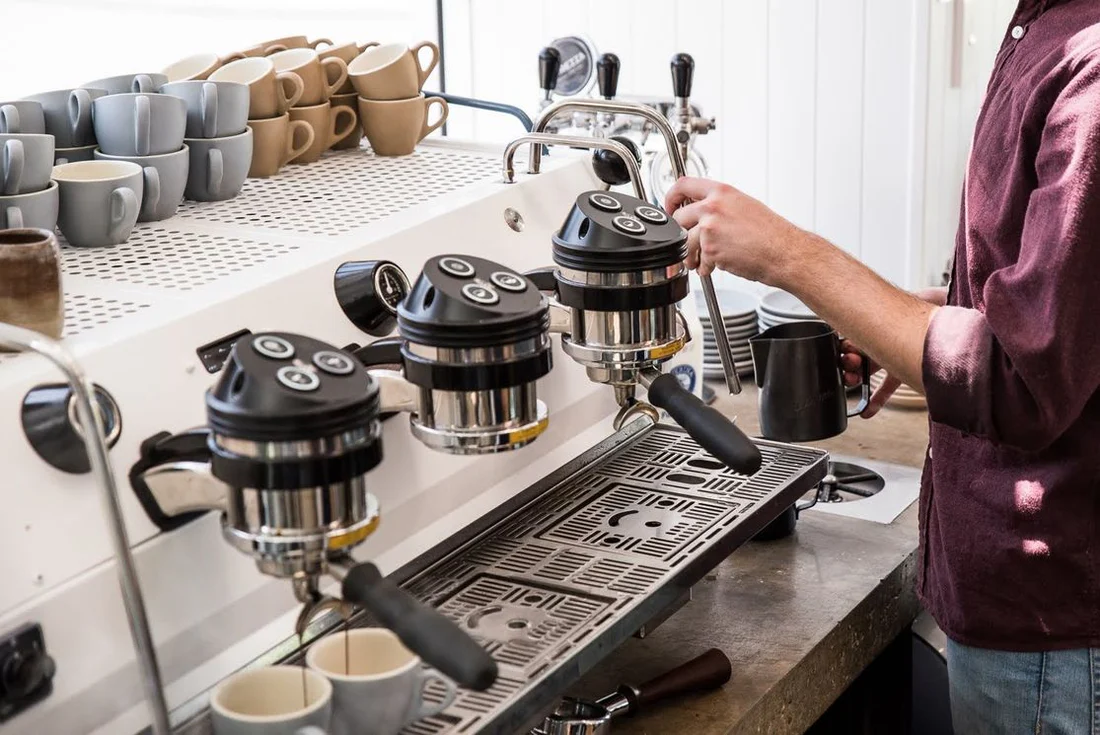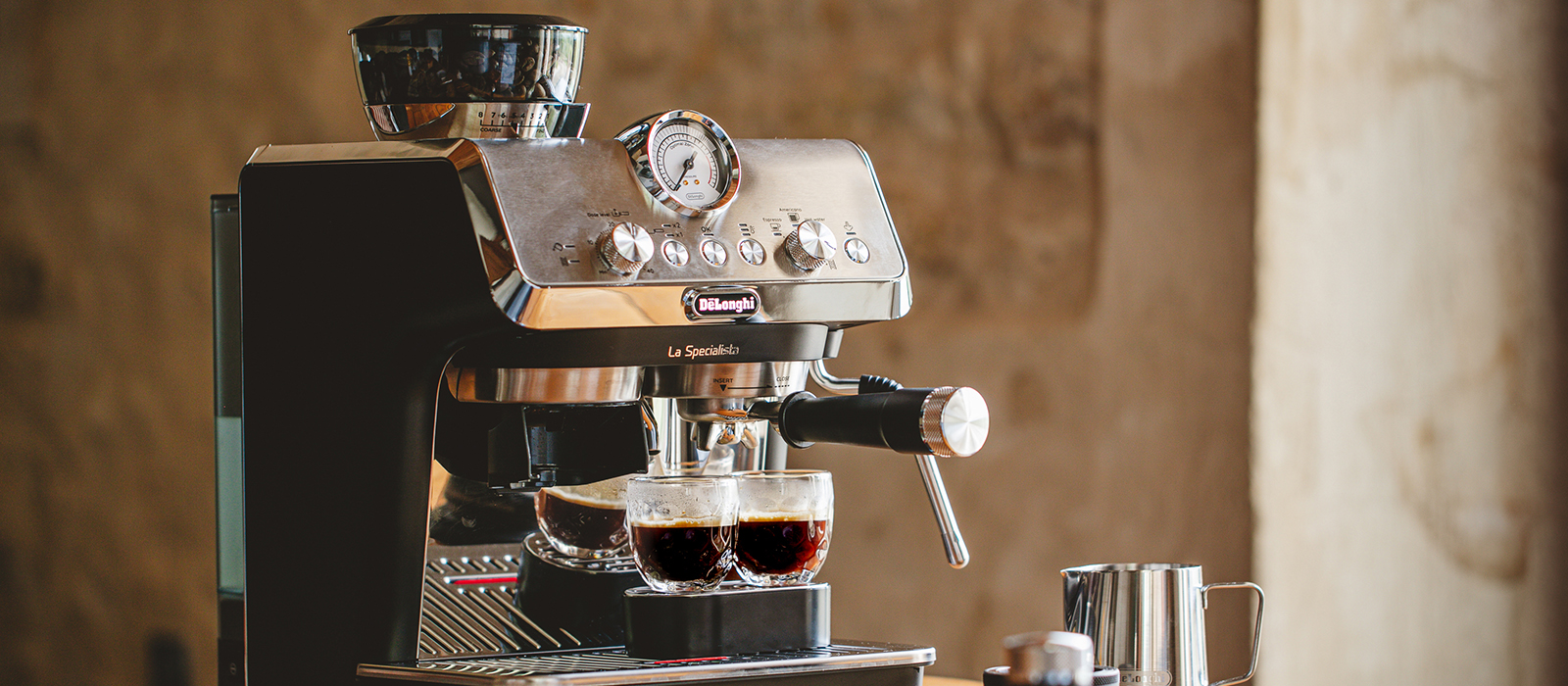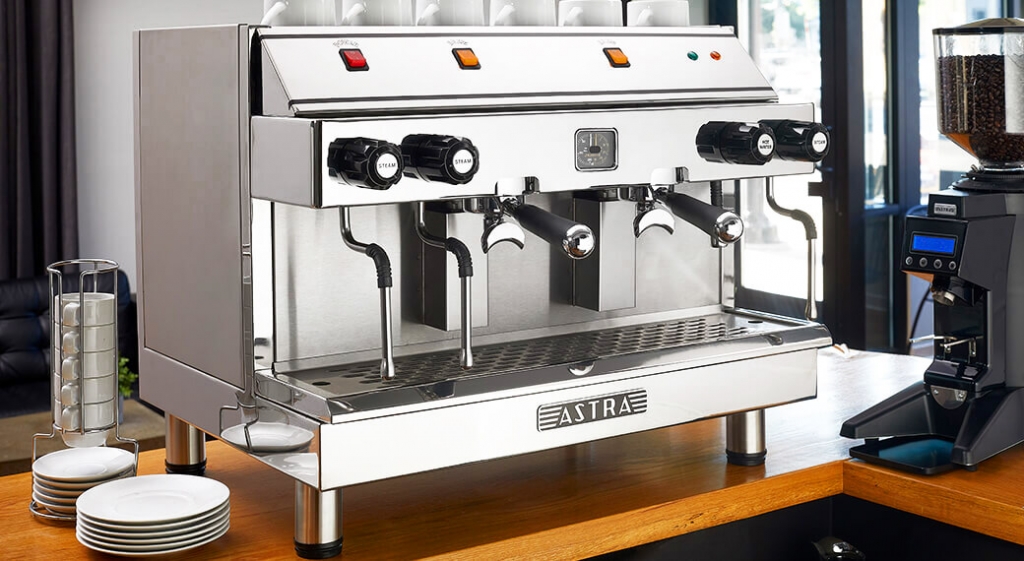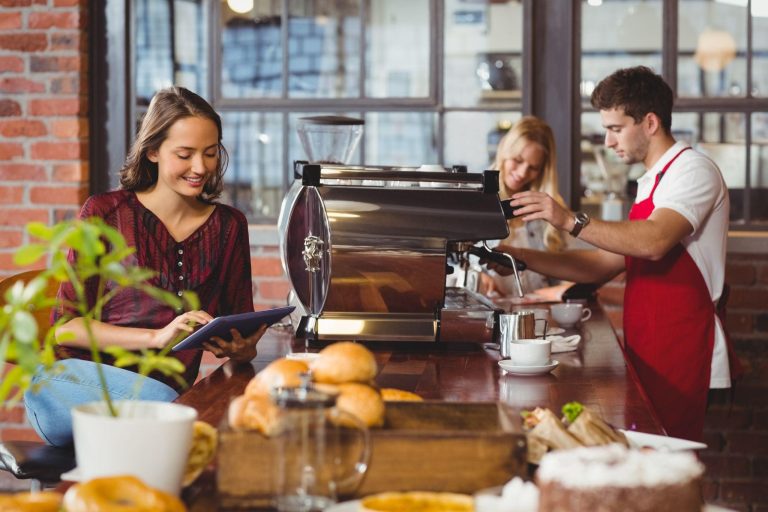Have you ever had an espresso machine break down in the middle of the morning rush? It’s frustrating, isn’t it? It doesn’t have to be.
With a proper commercial espresso machine, you can make the right choice for your café – let your machine do the heavy lifting.
This means fewer breakdowns, a consistent coffee experience, and ecstatic customers. It’s like having a reliable friend to help you through the toughest moments.
This is why finding the right espresso machine is critical for your café business. From minimizing downtime to experiencing no issues even during peak hours, you’ll find the right ally.
Inside a Commercial Espresso Machine
 To sum up, commercial espresso machines are the most important piece of equipment in a café. They are built for high volumes and high-quality, consistent production.
To sum up, commercial espresso machines are the most important piece of equipment in a café. They are built for high volumes and high-quality, consistent production.
Their main components are:
- Group head: This is where the espresso shot is brewed. Water passes through the grounds, ensuring proper extraction. The ultimate goal of this component is to produce well-balanced and flavorful espresso.
- Portafilter: It is a handle that locks into the group head with the coffee grounds. Designed to withstand high pressure and ensure even water flow through the coffee, this part affects consistency.
- Boiler: This heats water up to 200°F, the necessary temperature to make espresso. A machine can have multiple boilers, allowing at least two processes, brewing and steaming, to be performed separately and simultaneously. This is faster and fits high demand.
However, it is also vital that all parts function in such a way that they don’t slow down the process immensely when something goes wrong.
Is Manual Espresso Right for You?
 Manual commercial espresso machines, aka lever machines, are unique and give the barista complete control over the espresso-making process.
Manual commercial espresso machines, aka lever machines, are unique and give the barista complete control over the espresso-making process.
They are a great choice for coffee business owners who are serious about coffee.
Features
- Precision Brewing: Lever machines offer the barista the ability to adjust pressure, typically 6-9 bars, during the extraction process, coaxing out the flavors compared to automatic machines.
- Temperature Consistency: These machines are excellent at keeping water vats at a steady temperature between 90-96°C.
- Built to Endure: High-quality materials such as brass and stainless steel enable these machines to handle high café volumes with minimal breakdowns. The simple mechanics also translate to repairs that are inexpensive and easy, potentially saving you thousands of dollars in service costs over time.
- Craft Coffee Experience: Baristas have full autonomy over the extraction process, from grinds to pressure. This level of control allows for more consistent, predictable shot pour outcomes.
Perks
- You can control literally every aspect of coffee-making. The pressure, water flow, and timing are all adjustable when it comes to producing each individual espresso shot.
- With enough experience, you will produce truly amazing espresso. It will be just how you like it every time.
- These machines are stylish and old-fashioned, and they can be a great look in high-end venues – an amazing part of the experience for the customer.
Drawbacks
- A lot of practice is required to operate a manual machine. The barista should have his or her own experience and knowledge of pressure and extraction time.
- Using a manual machine requires strength and precision with each lever pull, which can be tiring.
- You need to invest in additional appliances such as grinders and proper tamping tools, which can be expensive.
Automatic Commercial Espresso Machines For Perfect Coffee
 With the push of a button, they produce the perfect cup of coffee. The process is fast and consistent.
With the push of a button, they produce the perfect cup of coffee. The process is fast and consistent.
Automatic machines are great for busy cafes that need to get excellent coffee into the hands of customers quickly and predictably.
Fully Automatic Machines
These machines do the bulk of the work for you. You simply press a button, and they grind, brew, and occasionally even froth the coffee.
Fully automatic machines are ideal for busy places. They are simple to operate and a convenient way to guarantee that every cup of coffee tastes the same, thus saving you time as well.
Super-Automatic Machines
They are absolutely right at the top of the line because these machines grind beans, brew coffee, froth milk, and serve.
They also offer convenience and speed since all you need to do to get an espresso is to press the button.
Moreover, these espresso machines may have something extra, for instance, various drink settings and self-cleaning. Another key point is that it can brew an espresso in less than 30 seconds, which is perfect for a very busy café.
Semi-Automatic Machines
While these machines automate some of the processes, a barista will have to grind and tamp the beans. Consequently, semi-automatic would be the best option.
Even after programming the machine, the barista still has control over some parts of the coffee-making process for quality.
At the same time, the machine handles pressure and temperature control for ease. These machines are perfect for a café that wants control yet still values comfort.
Features
- Quick, Push-Button Operation: Automatic espresso machines make the perfect shot of espresso at the push of a button. Brewing espresso is fast. Just press the button, and the machine will brew you the ultimate shot. Almost all models will brew a shot of espresso in under 30 seconds. An example is the Breville Barista Express; it takes 30 seconds for the espresso to brew.
- Consistent Pressure and Temperature: Since they are automatic machines, they can regulate the pressure and temperature. It will brew at the perfect temperature, about 200 degrees F and pressure of 9 bars. This produces good coffee every time.
- Programmable Settings: You can also enter the settings for various coffee drinks. Programming capabilities enable you to brew various coffee drinks uniformly. This saves time and ensures that the coffee is made in the same way every time. Fewer espresso makers can set various coffee drinks.
- Built-In Grinder: Most automatic machines have a grinder, which means you don’t need to buy a burr grinder. Freshly ground coffee beans will improve your espresso. The grinders frequently include numerous grind settings for various types of coffee.
- Automatic Milk Frother: Some include an automatic milk frother. Making a latte or cappuccino is a straightforward process. The frother heats and froths the milk for you. It will also provide the perfect temperature. Some machines can froth steamed milk in less than a minute.
Perks
- No need for extensive training, as you just push a button to brew a coffee.
- Maintains high quality. Thanks to constant pressure and temperature, every cup will taste the same.
- Can make multiple types of coffee, with some machines saving over 20 different drink settings.
- Includes grinders and milk frothers, saving time and space. Can reduce preparation time by up to 50%.
- Brews an espresso in less than 30 seconds, allowing you to satisfy high-demand situations.
Drawbacks
- Having less control over the brewing process.
- Can be expensive, especially super-automatic ones.
- Requires regular cleaning and maintenance to function properly.
- Can have breakdowns of advanced features, and so on.
Cost Analysis
Finally, when you reach the point where you get a commercial espresso machine, do not forget the following.
Choosing a device is not only about the initial cost of purchase, but also about a set that includes the initial investment, maintenance and operating costs, and ROI.
| Cost Factor | Manual Machines | Automatic Machines |
|---|---|---|
| Initial Investment | $1,000 – $5,000 (up to $10,000) | $4,000 – $30,000 |
| Maintenance Costs | $200 – $500 annually | $300 – $1,000 annually |
| Operating Costs | Lower, simpler mechanics | Higher, advanced components |
| ROI | Good long-term value, needs skilled baristas, slower | Higher efficiency, faster service, consistent quality, higher revenue potential |
Conclusion
Choosing a commercial espresso machine is a critical determinant in your café’s business. While more expensive, automatic machines have several benefits.
They are more efficient and fast, and they produce the same quality of coffee in significant quantities, making them ideal for busy locations.
This implies you can serve more clients promptly while maintaining high standards and achieving substantial profits. The high-end and reliable ones from La Marzocco and Nuova Simonelli are great options. De’Longhi and Jura super-automatics are also exceptional.
Appliances Baron has a large collection of fully automatic commercial espresso machines. This site offers favorable and top-notch alternatives that will guarantee your café’s success.

